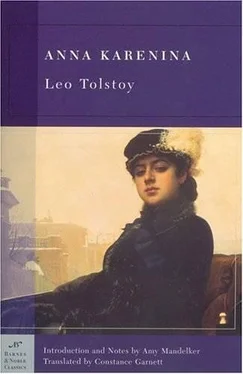Leo Tolstoy - Anna Karenina
Здесь есть возможность читать онлайн «Leo Tolstoy - Anna Karenina» весь текст электронной книги совершенно бесплатно (целиком полную версию без сокращений). В некоторых случаях можно слушать аудио, скачать через торрент в формате fb2 и присутствует краткое содержание. Жанр: Классическая проза, на английском языке. Описание произведения, (предисловие) а так же отзывы посетителей доступны на портале библиотеки ЛибКат.
- Название:Anna Karenina
- Автор:
- Жанр:
- Год:неизвестен
- ISBN:нет данных
- Рейтинг книги:4 / 5. Голосов: 1
-
Избранное:Добавить в избранное
- Отзывы:
-
Ваша оценка:
- 80
- 1
- 2
- 3
- 4
- 5
Anna Karenina: краткое содержание, описание и аннотация
Предлагаем к чтению аннотацию, описание, краткое содержание или предисловие (зависит от того, что написал сам автор книги «Anna Karenina»). Если вы не нашли необходимую информацию о книге — напишите в комментариях, мы постараемся отыскать её.
Anna Karenina — читать онлайн бесплатно полную книгу (весь текст) целиком
Ниже представлен текст книги, разбитый по страницам. Система сохранения места последней прочитанной страницы, позволяет с удобством читать онлайн бесплатно книгу «Anna Karenina», без необходимости каждый раз заново искать на чём Вы остановились. Поставьте закладку, и сможете в любой момент перейти на страницу, на которой закончили чтение.
Интервал:
Закладка:
"Well, about that unanimity, that's another thing, one may say," said the Prince. "There's my son-in-law, Stepan Arkadyevich- you know him. He's got a place now on the committee of a commission and something or other, I don't remember. Only there's nothing to do in it- why, Dolly, it's no secret- and a salary of eight thousand! You try asking him whether his post is of any use- he'll prove to you that it's most necessary. And he's a truthful man, too, but one can't help but believe in the utility of eight thousand roubles."
"Yes- he asked me to give a message to Darya Alexandrovna about the post," said Sergei Ivanovich reluctantly, feeling the Prince's remark to be ill-timed.
"So it is with the unanimity of the press. That's been explained to me: as soon as there's war their incomes are doubled. How can they help believing in the destinies of the people and the Slavonic races- and all that sort of thing?…"
"I don't care for many of the papers, but that's unjust," said Sergei Ivanovich.
"I would only make one condition," pursued the old Prince. "Alphonse Karr said a capital thing before the war with Prussia: 'You consider war to be inevitable? Very good. Let everyone who advocates war be enrolled in a special regiment of advance guards, for the vanguard of every assault, of every attack, to lead them all!'"
"A nice lot the editors would make!" said Katavassov, with a loud roar, as he pictured the editors he knew in this picked legion.
"But they'd run," said Dolly. "They'd only be in the way."
"Oh, if they ran away, then we'd have grapeshot or Cossacks with whips behind them," said the Prince.
"But that's a joke, and a poor one too, if you'll excuse me saying so, Prince," said Sergei Ivanovich.
"I don't see that it was a joke, that… Levin was beginning, but Sergei Ivanovich interrupted him.
"Every member of society is called upon to do his own special work," said he. "And men of thought are doing their work when they express public opinion. And the singlehearted and full expression of public opinion is the service of the press, and a phenomenon to rejoice us at the same time. Twenty years ago we should have been silent, but now we have heard the voice of the Russian people, which is ready to rise as one man and ready to sacrifice itself for its oppressed brethren; that is a great step and a proof of strength."
"But it's not only making a sacrifice, but killing Turks," said Levin timidly. "The people make sacrifices and are ready to make sacrifices for their soul, but not for murder," he added, instinctively connecting the conversation with the ideas that had been absorbing his mind.
"For their soul? That, you understand, is a most puzzling expression for a student of the natural sciences. What sort of thing is the soul?" said Katavassov, smiling.
"Oh, you know!"
"No, by God, I haven't the faintest idea!" said Katavassov with a loud roar of laughter.
"'I bring not peace, but a sword,' says Christ," Sergei Ivanovich rejoined for his part, quoting as simply as though it were the easiest thing to understand the very passage that had always puzzled Levin most.
"That's so, no doubt," the old man repeated again. He was standing near them and responded to a chance glance turned in his direction.
"Ah, my dear fellow, you're defeated, utterly defeated!" cried Katavassov good-humoredly.
Levin reddened with vexation, not at being defeated, but at having failed to control himself and being drawn into argument.
"No, I can't argue with them," he thought; "they wear impenetrable armor, while I'm naked."
He saw that it was impossible to convince his brother and Katavassov, and he saw even less possibility of himself agreeing with them. What they advocated was the very pride of intellect that had almost been his ruin. He could not admit that some dozens of men, among them his brother, had the right, on the ground of what they were told by some hundreds of glib volunteers swarming to the capital, to say that they and the newspapers were expressing the will and feeling of the people, and a feeling which was expressed in vengeance and murder. He could not admit this, because he neither saw the expression of such feelings in the people among whom he was living, nor found them in himself (and he could not but consider himself one of the persons making up the Russian people), and most of all because he, like the people, did not know and could not know what is for the general good, though he knew beyond a doubt that this general good could be attained only by the strict observance of that law of right and wrong which has been revealed to every man, and therefore he could not wish for war or advocate war for any general objects whatever. He said as Mikhailich did and the people, who had expressed their feeling in the traditional invitations to the Variaghi: "Be princes and rule over us. Gladly we promise complete submission. All the labor, all humiliations, all sacrifices we take upon ourselves; but we will not judge and decide." And now, according to Sergei Ivanovich's account, the people had foregone this privilege they had bought at such a costly price.
He wanted to say, too, that if public opinion were an infallible guide, then why were not revolutions and the commune as lawful as the movement in favor of the Slavonic peoples? But these were merely thoughts that could settle nothing. One thing could be seen beyond doubt- that at the actual moment the discussion was irritating Sergei Ivanovich, and so it was wrong to continue it. And Levin ceased speaking and then called the attention of his guests to the fact that the storm clouds were gathering, and that they had better be going home before it rained.
XVII
The old Prince and Sergei Ivanovich got into the wagonette and drove off; the rest of the party hastened homeward on foot.
But the storm clouds, turning white and then black, moved down so quickly that they had to quicken their pace to get home before the rain. The foremost clouds, lowering and black as soot-laden smoke, rushed with extraordinary swiftness over the sky. They were still two hundred paces from home and a gust of wind had already blown up, and every second the downpour might be looked for.
The children ran ahead with frightened and gleeful shrieks. Darya Alexandrovna, struggling painfully with her skirts clinging round her legs, was not walking, but running, her eyes fixed on the children. The men of the party, holding their hats on, strode with long steps beside her. They were just at the steps when a big drop fell splashing on the edge of the iron guttering. The children and their elders after them ran into the shelter of the house, talking merrily.
"Katerina Alexandrovna?" Levin asked of Agathya Mikhailovna, who met them with shawls and plaids in the hall.
"We thought she was with you," she said.
"And Mitia?"
"In Kolok, he must be, and the nurse with him."
Levin snatched up the plaids and ran toward the copse.
In that brief interval of time the storm clouds had moved on, covering the sun so completely that it was dark as an eclipse. Stubbornly, as though insisting on its rights, the wind stopped Levin, and tearing the leaves and flowers off the linden trees and stripping the white birch branches into strange unseemly nakedness, it twisted everything to one side- acacias, flowers, burdocks, long grass, and tall treetops. The peasant girls working in the garden ran shrieking into shelter in the servants' quarters. The streaming rain had already flung its white veil over all the distant forest and half the fields close by, and was rapidly swooping down upon the copse. The wet of the rain spurting up in tiny drops could be smelled in the air.
Holding his head bent down before him, and struggling with the wind that strove to tear the wraps away from him, Levin was moving up to the copse and had just caught sight of something white behind the oak tree, when there was a sudden flash, the whole earth seemed on fire, and the vault of heaven seemed crashing overhead. Opening his blinded eyes, Levin gazed through the thick veil of rain that separated him now from the copse, and to his horror the first thing he saw was the green crest of the familiar oak tree in the middle of the copse uncannily changing its position. "Can it have been struck?" Levin hardly had time to think when, moving more and more rapidly, the oak tree vanished behind the other trees, and he heard the crash of the great tree falling upon the others.
Читать дальшеИнтервал:
Закладка:
Похожие книги на «Anna Karenina»
Представляем Вашему вниманию похожие книги на «Anna Karenina» списком для выбора. Мы отобрали схожую по названию и смыслу литературу в надежде предоставить читателям больше вариантов отыскать новые, интересные, ещё непрочитанные произведения.
Обсуждение, отзывы о книге «Anna Karenina» и просто собственные мнения читателей. Оставьте ваши комментарии, напишите, что Вы думаете о произведении, его смысле или главных героях. Укажите что конкретно понравилось, а что нет, и почему Вы так считаете.












